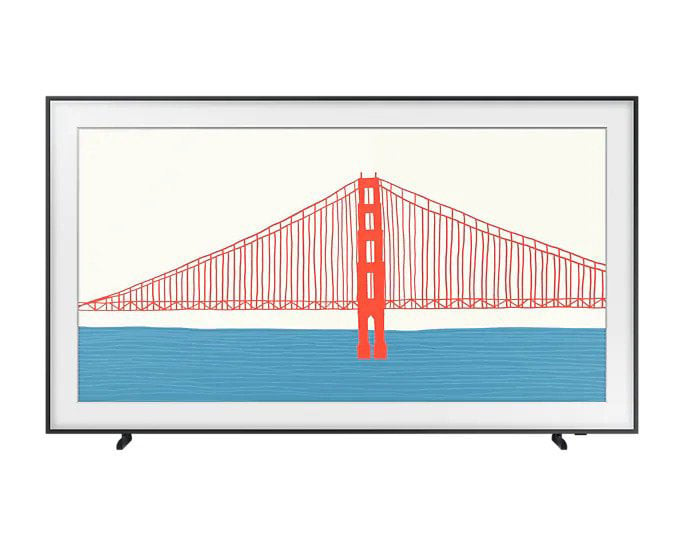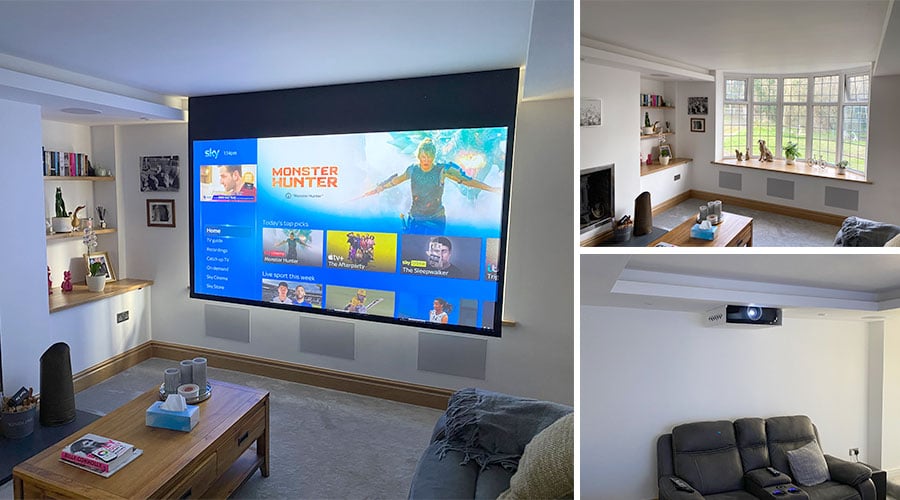TV vs Projector: Which one should I choose?
TV vs Projector: Which one should I choose?
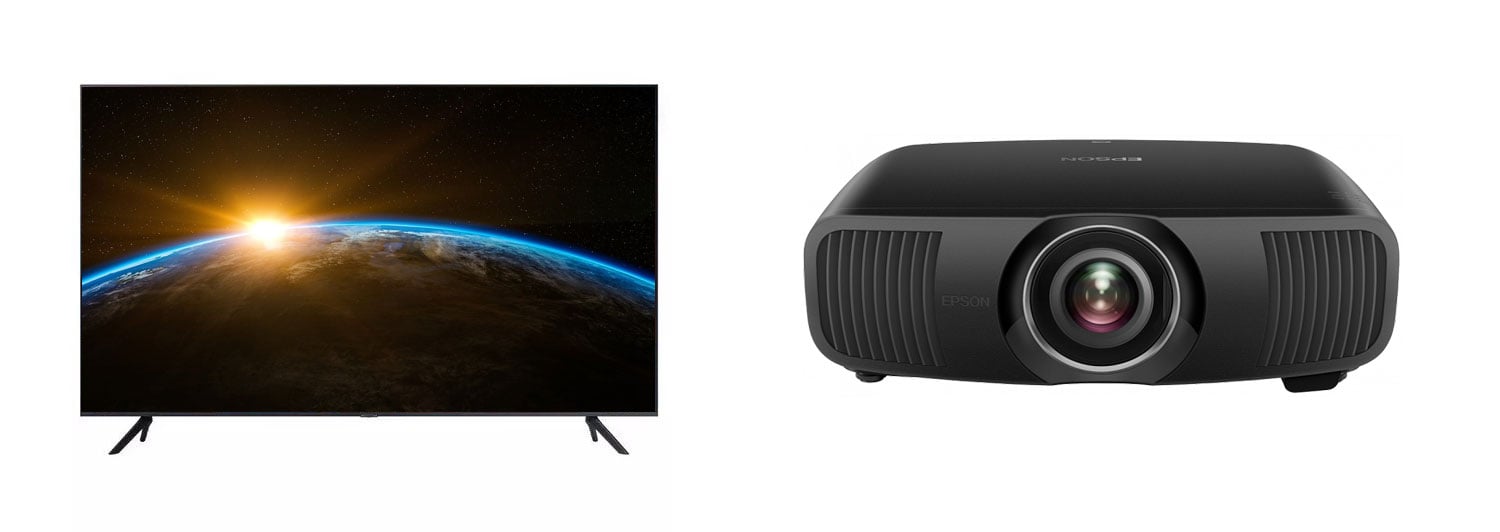

If you're after a big screen then you may be asking yourself whether to go for a TV or projector. In 2020, around 27 million or 95% of all households in the UK owned a TV set. It is not surprising then that this is the first thing people think of adding to their own to play their favourite movies, games or TV series. For many their only experience of a projector will be during a presentation or back in their school days.
So we often get asked the question: why wouldn't I just buy a big TV? The answer is simple: if you want to you can, it's a personal choice! As with everything in the tech world there are pros and cons for each option. To make your decision a little easier lets run through some of the buying factors and compare TVs to projectors.
Buying factors
- A big screen
- Aesthetics
- Smart functionality
- Installation
- Price
- Picture Quality
A big screen - Getting the biggest size
Size is now a big factor for people selecting a TV. There’s a good reason cinemas use projectors. When it comes to creating a massive picture, TV screens just don’t compete. Very large screens have become readily available in high street shops and these can be very enticing. But the biggest TV you will be able to get your hands on from a regular retailer is around 98” with the most popular size being 85”.
Now an 85” screen is usually large enough for most home settings but if you truly want a large screen projector screens will win hands down you can easily get in excess of 100” up to 130” from us here at Pure Theatre.
Aesthetics - Making a TV look good in your room
The other massive factor of course is that 85” TVs are indeed huge. Strap one to your wall and it can quickly become an eyesore. If you are trying to create a beautiful room you will need to build the room around the TV to make it look like it's part of the design. So what are your options:
Media Wall
Many people now opt for a media wall where they recess or mount their huge TV on a wall often above a fireplace. This creates a feature within the room which makes the TV look like it is part of the space. A media wall is a good option if you use the TV a lot, but it's worth noting that when the TV is switched off you are still left with an 85” black box on your wall. If you are going for a media wall and are building a structure to house it, it's worth thinking about integrating speakers into the structure too, check out this blog on choosing speakers for a media wall.
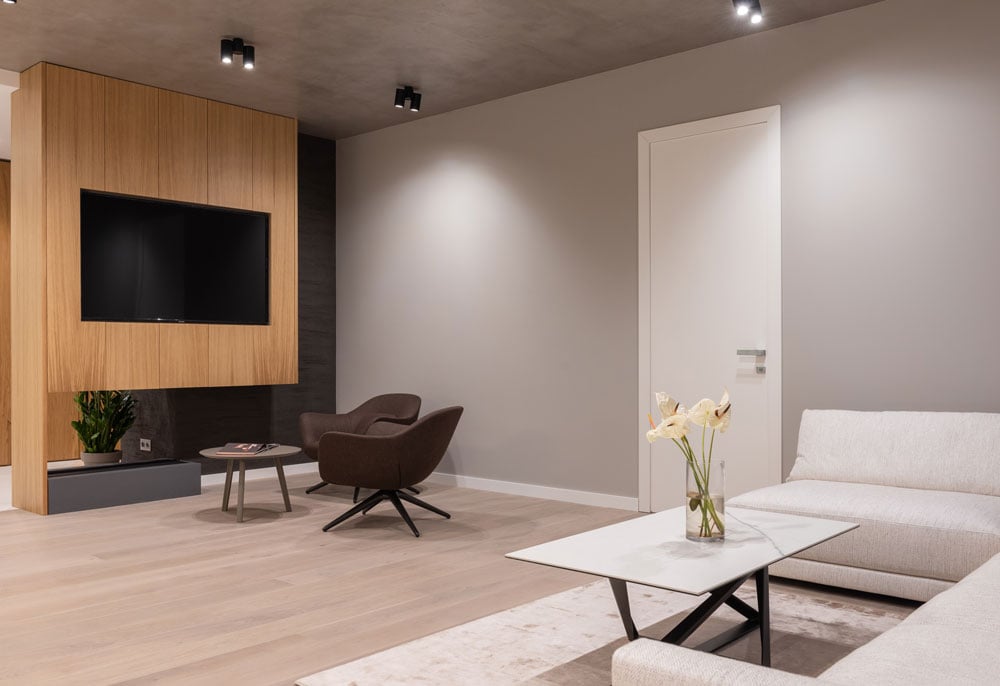

Mirror/Picture Frame TVs
To get away from the big black box on your wall TV manufactures have come up with novel ideas such as Mirror TVs or picture frame TVs.
Some people love them. In our experience they do neither job as well as users expect. Mirror TVs use a dielectric mirror which is a high transparency mirror that allows you to see a TV through it. We find that the mirror effects the TV quality more than the manufacturers would like to you believe.
Likewise the picture frame TVs are fantastic as a television but are not convincing as artwork. They all too often have a backlit effect which simply does not showcase artwork in the right light, pardon the pun. Not to mention the energy you will be using whilst constantly running a TV.
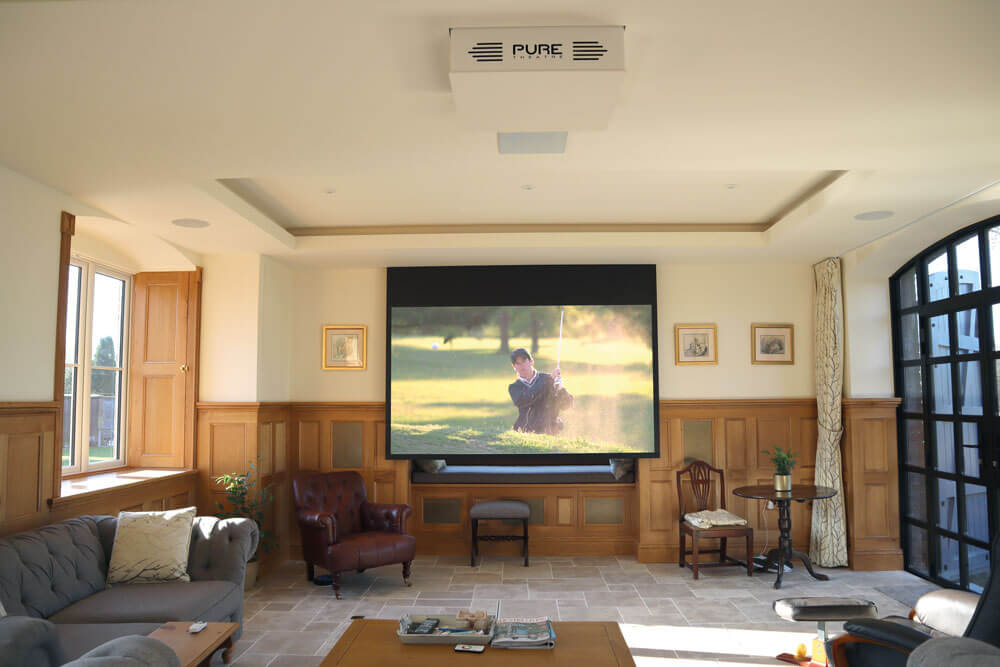

Projector Screen and Projector Lift down
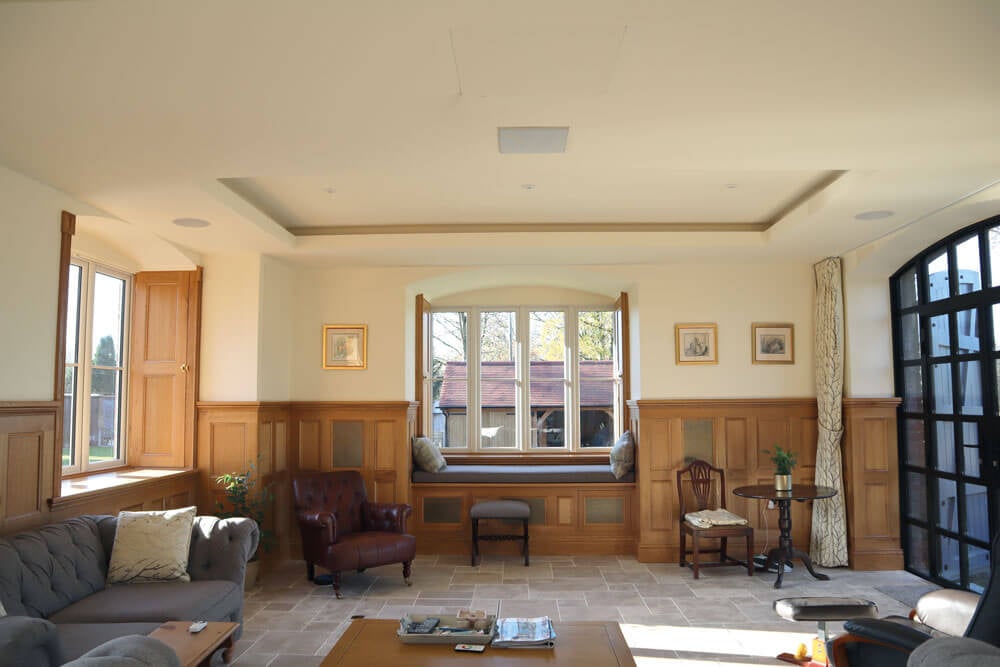

Projector Screen and Projector Lift recessed (Hidden in Ceiling)
Concealed Projector Screen and Projector Lift
So a media wall being the focus of your room isn't for you and you're not sold by novelty tech what's the alternative?
Well concealed projector screens can give you that all important big screen when you want it but disappear when you don't. They work on a roller tube type mechanism that retracts into your ceiling at the touch of a button. If you have people over and don't want the focus to be the TV then your usual mirror or artwork could sit behind it and the screen can disappear from view. No more designing your room around a big screen.
This period property renovation has windows or doors on all walls meaning wall mounting a TV is not possible. Adding a ceiling recessed screen and projector lift meant that the owners can hide it all away when its not being used and enjoy this stunning space. In settings like this aethteically a projector is a much better option.
Smart functionality - playing your favourite services
The big question is are smart TVs really that smart? Any screen which has built in tech has one big problem it will date, fast! Technology moves at an incredible speed and if you are spending all your money on that 85” TV and relying on its built in tech then you may be impressed now but find you're disappointed in 2 years when a better quicker model comes out.
Streaming services are becoming the go to for most peoples TV fix and you need speed. With a projector you will be likely using an AV receiver to play all your devices. So if something is becoming laggy simply upgrade the device, a much smaller price to pay that upgrading an entire TV. A projector screen will last years and years as will your projector.
Installation
TV’s are a plug and play option. But be aware that once you start getting to large sizes like 85” they are not easy to maneuver and will need some thought in terms of placement. When wall mounting a TV this large you will need to ensure you have a mount which can handle the weight. As we have mentioned these types of screens will need to be planned around when you build your room so although they can seem like the easier option if you are going for a media wall you will have building costs involved.
Installing a projector is simpler than you think. A recessed screen which retracts only requires 11cm above your ceiling and therefore can be fitted relatively easily. Projectors can use a projector lift if you want it to hide away or can just sit on a shelf or mounted to your ceiling. Fitting a completely concealed home cinema is easier to do if you are still building the room or in the middle of a renovation.
Price - which is cheaper TV or projector?
Many people choose a TV because they think it will be a more affordable option. Of course you can get affordable TVs such as an 85” Samsung TV for around £1,799.00. In the same vein you can pick up cheaper projectors and screens. But you need to ask yourself what quality you are getting for that price.
If we compare the same type of quality then you would be looking at TVs which are closer to the £5000 mark and this is only providing you with a 85” screen. Samsung do a 98” TV but this will set you back a whopping £17,999.00. An 86” projector screen would set you back £1,150 team this up with an Epson 9400 projector for £2,500 and you’ve got yourself a pretty impressive setup for £3,650.
"Projectors enable you to watch TV and films on an over 100-inch screen at home, and you won't need to win the lottery to buy one."
Picture Quality
It has to be said that high end TVs now offer fantastic picture quality, the colour and contrast ratios and impressive colour palettes produce stunning clear images. Just about any smart TV you buy will offer a 4K picture and likely HDR on top of that.
Buying the right projector is a little more complicated. There are amazing projectors on the market which will offer you fantastic picture quality but you need to know what you are looking for so check out our projector buying guide.
For simplicity you just need to understand that if you get the right projector picture quality will be as good if not better than a TV.
You should remember that any screen will be affected by direct sunlight even TVs. For TVs this will be in the form of glare and reflections. Most of us have had those bright days where we have to pull the curtains too because its almost impossible to see the screen with the amount of glare.
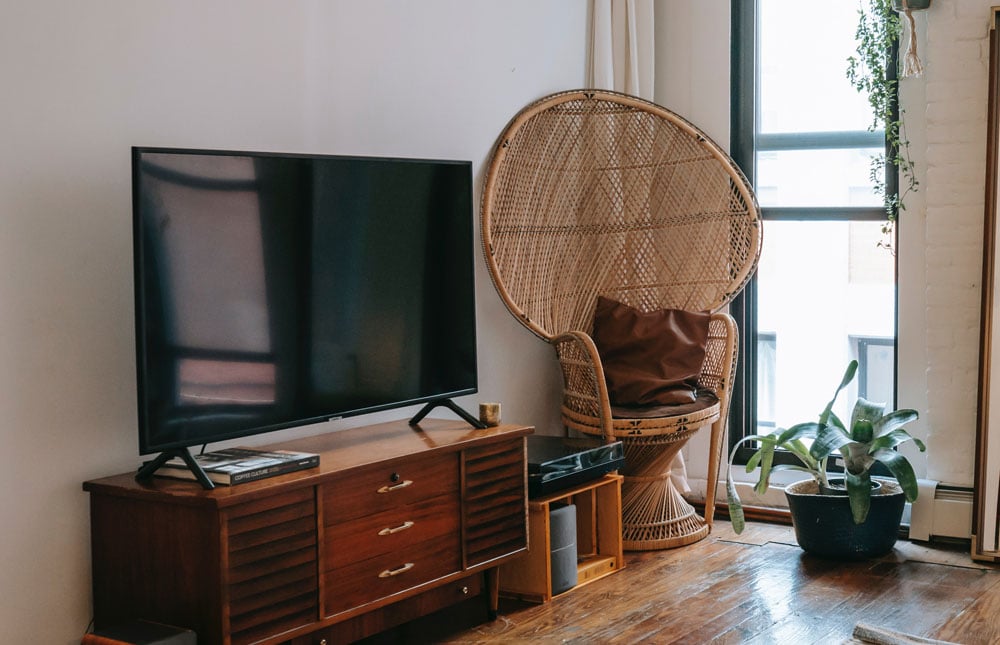

Example of glare and reflections on a TV
Can a projector work with ambient light?
The main concern most people have with a projector is whether it will handle light. The projectors of the past would need an almost pitch black room to give you a clear picture.
Glare would not be an issue with a projector screen. The amount of lumens which today's high end projectors have mean they perform impressively well with ambient light. You would be able to watch all of your usual TV shows with the lights in your room switched on. Of course direct sunlight will impact black levels and therefore you would need to put some mild measures in place if you have an excessively bright room.
TV vs Projector Pros and Cons
| Pros | Cons | |
| TV |
|
|
| Projector |
|
|
Summary of Projector vs TV
As stated at the beginning of this advice piece the choice between a projector or TV is a personal one and will depend on your room. That said if you want great picture quality on a really big screen that doesn't dominate your space a projector might just be for you.

 USD $
USD $ EUR €
EUR €
